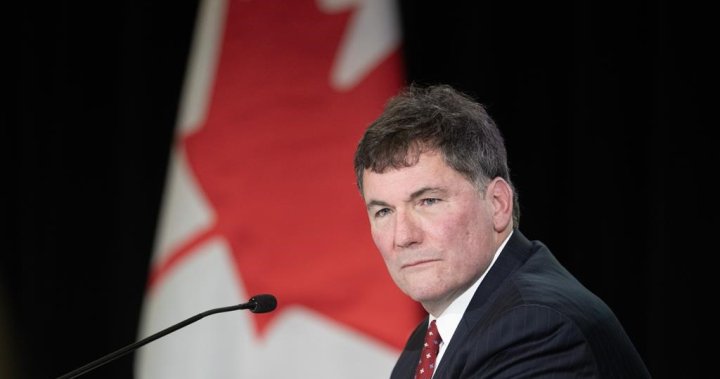Canada’s public safety minister says legislation will be introduced “very soon” that will strengthen measures used to combat foreign interference, but adds he’s confident in the safeguards already in place and the agencies overseeing them.
Friday saw the issue of foreign interference revived into public view on multiple fronts. The commissioner overseeing an inquiry into foreign attempts to meddle in Canada’s last two elections released an interim report that found those attempts undermined the rights of Canadian voters because they “tainted the process” and eroded public trust, even though they did not change the overall results.
Commissioner Marie-Josée Hogue stressed Ottawa needs to “work hard” to restore that trust by both informing Canadians of the threat of foreign interference and taking “real and concrete steps” to detect and deter it.
Hours after that report was released, RCMP announced it had arrested three Indian nationals charged with murder and conspiracy in the 2023 killing of B.C. Sikh leader Hardeep Singh Nijjar, whom India had declared was a “terrorist.” The federal government has said there are “credible allegations of a potential link” between Nijjar’s death and agents of the Indian government.
Global News reported Nijjar was warned by Canadian Security and Intelligence Service officers that “professional assassins” were after him, and that India had tried to get the RCMP to arrest Nijjar on allegations that were deemed to be not credible.
Asked if he was still confident in Canada’s security and intelligence services after they failed to prevent Nijjar’s death, and in the wake of Hogue’s interim report, Public Safety Minister Dominic LeBlanc said he was. He also defended the actions the government has taken so far to strengthen those agencies’ ability to combat foreign threats.
“We think we have put in place a series of measures that have been effective,” he told Mercedes Stephenson in an interview that aired Sunday on The West Block. “Can they be strengthened? Can they evolve based on the recommendations of the Hogue report? Of course they can.”

LeBlanc pushed back on suggestions that Hogue had accused the Liberals of not doing enough on the issue, but said the government will in fact be taking further action.
“I put on notice in the House of Commons on Friday our intention to introduce legislation very soon that will strengthen our ability to detect and disrupt foreign interference,” he said. “So in terms of your question about strengthening legislative measures, I hope in the coming days I’ll be able to talk once it’s introduced in Parliament about the details of this legislation.”
The email you need for the day’s
top news stories from Canada and around the world.
LeBlanc did not say if the legislation will include establishing a foreign agents registry, a move first announced more than a year ago but has been delayed by further consultations.
The minister said he has not spoken to his Indian counterpart about the Nijjar homicide investigation before or after Friday’s arrests. He said the foreign affairs ministry is in regular contact with the Indian government.
“I don’t know what I would say to (my counterpart) about an ongoing police investigation or a criminal proceeding,” he said.
He did say he understands the concerns in Canada’s Indian diaspora and other diaspora communities, including in the Jewish and Muslim communities, about increased threats to their safety posed by their home governments and other threat actors. He said the government is working with communities to ensure they feel safe.

Yet he rejected suggestions that Canada is seen by those actors as a place of impunity to conduct election interference and assassinations, or that Canada is weaker on the issue than the U.S., where authorities thwarted an attempted assassination plot also linked to the Indian government.
“I would think if you saw the arrests made Friday … it’s the exact opposite of impunity,” he said. “The RCMP are very much at work and doing very good work in this regard.
“I think that what we saw is a first step in holding to account those that allegedly murdered a Canadian citizen. And that work continues.”
The public accusations against India for its alleged role in the killing of Nijjar have threatened a potential strategic alliance for Canada, which is seeking a broader Indo-Pacific strategy to counter China.
Dan Stanton, a former operations manager at the Canadian Security Intelligence Service, told Stephenson in a separate interview that aired on The West Block that Canada, unlike the U.S., is stuck in the “critical conundrum” of trying to hold India accountable while also pursuing a diplomatic and economic partnership.
“The Americans have basically moved on,” he said. “They recognize the importance of the relationship with India (while) still holding them to account, like Saudi Arabia moving forward.
“Canada, as a middle power, we really don’t have much leverage.”
While some form of justice may be served to Nijjar’s family by prosecuting the alleged killers, Stanton added, it will be far more difficult for Canada to get India to acknowledge its potential involvement.
“I don’t have a lot of hope for that,” he said.
— with files from Global’s Touria Izri, Alex Boutilier, and Stewart Bell
© 2024 Global News, a division of Corus Entertainment Inc.




